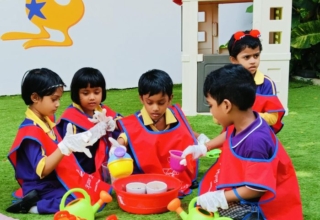
The Right to Education Forum (RTE Forum), a prominent civil society network engaged in advocacy of the right to education on June 23, 2023 sent feedback on the draft NCF for School Education to the Union Ministry of Education.
In this post, we reproduce an abridged version of this feedback/suggestion
The NCF would have been stronger if it included the Right to Education Act in general and the specific statutory RTE norms in its framework. The draft could have recognized the underpinning of education as a fundamental right for all children aged 6-14 years of age as part of the Article 21-A of the Constitution or the legacy of early childhood education is inherently part of the right to life under the Unnikrishnan Judgement.
The NEP has been pathbreaking in its focus on the educational continuum including early childhood and provides for ‘equitable and quality education until Grade 12 to all children up to the age of 18’ but disappointingly does not talk about the need for upward and downward extension of the RTE in domestic law. This puts into question India’s fulfilment of the SDG 4 Education 2030 agenda which includes a commitment to a minimum 12 years of free, publicly-funded, inclusive, equitable, quality primary and secondary education – of which at least nine years are compulsory.
While the NCF includes a chapter on inclusion, the document fails to live up to its potential by failing to respond to the inherent inequalities, discrimination, and segregation in India’s education system and provide a roadmap for how the transformative potential for education will be tapped into to create a more equal India. The NCF should set the direction for India to reduce and eventually end structural inequalities in the education system arising from unequal resourcing of the education systems; the quality gap between single-teacher schools and Kendriya Vidyalayas must be closed.
While the NCF talks about the criticality of having a flexible education system, we are deeply concerned that this will not be realized given the reality of resource constraints and would instead contribute to the legitimation of a two-track education system with those from poor and marginalized communities being pushed into the vocational track and from there into caste and gender stereotyped occupations.
The NCF does commit to addressing the educational challenges of girls but fails to suggest concrete measures to address behavioural and societal change required to correct gender inequality in educational settings. The text would be stronger if it explicitly mentioned girls’ education in the inclusion section and included concrete actions to tackle pressing issues such as gender-based violence, gender-based discrimination, the gendered digital divide and the underrepresentation of girls and women in STEM fields.
NCF talks about acknowledging the importance of local knowledge/Indianness which is important, we should not forget that in times of globalization, it is necessary to aspire to the highest standards globally, especially considering India’s aspirations to become a global leader. Knowledge has become universal since the Industrial Revolution and especially now in the age of the internet. It is good that children should know about India’s contribution to the world. At the same time, the child should also learn to critically appraise India’s weaknesses so that she will learn from past mistakes and find out a way for the future.
Children should be aware of present-day problems related to inequality, discrimination and the dangers resulting from climate change and be prepared to address them. The NCF could do more to reiterate the need to develop 21st Century Skills like Communication, cooperation, critical thinking, curiosity, and creativity to draw a balance between the traditional and the contemporary.
To improve the implementation of the NCF, it would be crucial to provide teachers with respect, professional status, and space to experiment and innovate in the classroom.
The document should spell out how the roles of the concerned officials will be supported to change to ensure a robust process of rollout. This should include a process of strengthening the backbone of the education administration and curriculum support including the CRCs and BRCs and its staff. This is particularly needed to address Informal practices that have become normalized in education settings that, while not part of stated policy, have become mainstream- e.g., streaming girls away from science and maths.
It is crucial to acknowledge the significance of School Management Committees (SMCs) in this context. The Right to Education (RTE) Act mandates the establishment of SMCs to involve parents and the community in the holistic functioning of schools. However, there exists a noticeable gap between teachers and SMC members; this section should highlight the need for strengthening this relationship.
The curriculum framework needs to give ample opportunity for the states to shape their curricula and materials. Thus, it is important to maintain diversity and inclusion as important principles in the choice of content for textbooks. Even within States, there are regional variations and these need to find adequate representation in textbooks. Balanced gender and community representation must be ensured.
A significant increase in the budget allocation to education, despite being part of the NEP, has not materialized. The prioritization of curriculum choice in such unequal educational contexts risks exacerbating inequality. Given the shortage of staff and facilities and the continued under-investment in education, most schools, particularly those in rural areas, are unlikely to offer the same choice of disciplines available to rich students in elite schools. Implementing such a flexible system will require the intake of a huge number of teachers and a significant upgrading of the education infrastructure. In contrast, a recent Parliamentary Standing Committee report found that over 9.8 lakh teaching positions are vacant in government schools across the country, which includes more than 2.5 lakh vacancies at the secondary level alone. Even in the current policy context of constrained curriculum choice, the choice of arts, commerce or science stream is highly constrained in terms of how systems are set up. Accordingly, the current school education system has neither the teaching force nor the infrastructure, to implement these changes.
‘The Forum does not support the introduction of vocational education from early ages; and certainly not before class 11-12 standards’
Address risks arising from increased segmentation in India’s already unequal education system through the heavy emphasis on vocational education. Nothing in the NEP or the NCF addresses the differential status between vocational and academic education in India’s society or the job market. Prioritizing vocational streams for students in rural areas will restrict opportunities for students from marginalized communities and poor families to get a chance to be admitted to academic courses that offer career paths to students; most of these in academic streams will likely be those from relatively privileged backgrounds. Prioritizing vocational streams for students in rural areas will restrict opportunities for students from marginalized communities and poor families to get a chance to be admitted to academic courses that offer career paths to students; most of these in academic streams will likely be those from relatively privileged backgrounds. There are concerns about the early introduction of employment-related vocational education.
Force-fitting vocational education from foundational stages in schooling and suggests Prevocational stages in the foundational and preparatory stages (preschool to class 5). This is unnecessary and artificial incorporation of the concept of vocational education at such an early age. The Forum does not support the introduction of vocational education from early ages; and certainly not before class 11-12 standards.
Introducing vocational education without addressing the challenges will not provide the necessary skills to children who opt for the course. Some of these challenges outlined include the lack of resources to set up practical workshops in schools, the absence of exposure centres for hands-on training, the lack of teacher education courses in vocational education, the lack of assessment systems and others. It is unclear how these will be addressed.
At the same time, the social perception that places a low value on vocational skills as a last resort in education and the absence of clear pathways for higher education after class 11-12 will push the majority of those who opt for vocational education into low-skilled casual employment, not very different from the informal sector employment they currently access.
Vocational education will promote child labour: The Child Labour Amendment Act, 2016 allowing children to work in family occupations combined with the provision of vocational education in early classes will further promote child labour pushing them into caste and gender-based work and employment.
Vocational education as outlined in the draaft risks further pushing girls and children from marginalised communities out of school before they even explore their interests or potential and deepen the existing caste-class-gender bias and inequalities in education and be a step away from the progressive steps that have been taken since independence to promote education access in school and higher education and reduce educational inequalities. Even as the approach recognizes the existence of ‘equity considerations’ (9.2 Pg 429) and states its intention to be to not push children into caste and gender-based vocations, there are no strategies to prevent this from happening.










